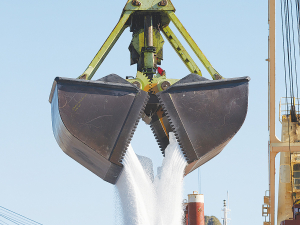Ravensdown partners with Footrot Flats to celebrate Kiwi farming heritage
Ravensdown has announced a collaboration with Kiwi icon, Footrot Flats in an effort to bring humour, heart, and connection to the forefront of the farming sector.
 The 2,700 tonnes of urea from Saudi Arabia is key to supporting Ravensdown's commitment to reduce carbon emissions by 50% by 2030.
The 2,700 tonnes of urea from Saudi Arabia is key to supporting Ravensdown's commitment to reduce carbon emissions by 50% by 2030.
Fertiliser co-operative Ravensdown recently received a delivery of low-carbon urea - a major step to lower its environmental footprint.
The 2,700 tonnes of urea from Saudi Arabia, SABIC Agri-Nutrients Company (SABIC AN), is key to supporting Ravensdown's commitment to reduce carbon emissions by 50% by 2030.
Ravensdown chief executive Garry Diak says the collaboration with SABIC AN is crucial. It's also the first ever global shipment of low-carbon urea for the Saudi Arabian company.
"As pressure mounts for New Zealand farmers to lower greenhouse gas emissions from behind the farm gate, we are working on their behalf right through the value chain to support them," says Diack.
"SABIC AN's innovative manufacturing techniques for urea production have the potential to be game changing for the global fertiliser industry. We are excited to continue our valued collaboration with a company that has environmental goals and aspirations that are very aligned to our own."
Leading independent testing, inspection, and certification agency TÜV Rheinland has confirmed that the urea manufacturing process produces 64% less carbon dioxide per tonne of urea than standard processing.
While it's manufactured using less carbon, the properties of the urea remain the same. This means emissions generated using the urea on pasture or crops does not change and the low carbon advantage is captured as a scope 3 (indirect) emission only.
"We continue to develop our 25-year relationship with SABIC AN, working together on future innovations to reduce the carbon footprint of the whole supply chain," says Diack.
SABIC AN says the innovative manufacturing solution for low carbon urea was recently recognised by the prestigious Edison Awards as a Gold Food and Agriculture Advancements "Soil & Crop" category.
Saudi Arabia is already a pioneer in the production and export of clean hydrogen and derivatives such as ammonia. It has partnered with New Zealand on this innovative venture as part of its ambitious strategy to be the world's leading clean hydrogen hub, the company says.
The kingdom is seeking to forge partnerships with entities from all over the world to help them meet their clean energy targets.
SABIC AN chief executive Abdulrahman Shamsaddin says sustainability is integrated into its strategy, enabling them to deliver responsible business and generate sustainable growth.
"We are constantly developing solutions empowering our customers to achieve their own sustainability ambitions.
"Our collaboration with Ravensdown is a major step in this direction and a strong indicator of SABIC's overall commitment to delivering low-carbon solutions to customers and helping them achieve their net-zero targets."
The World Wide Sires National All Day Breeds Best Youth Camp Best All Rounder plaudit has become family affair, with 2026 Paramount Cup winner Holly Williams following in her sister Zara's footsteps.
DairyNZ is giving New Zealand farmers a unique opportunity to gain hands-on governance and leadership experience within the dairy sector.
Herd improvement company LIC has posted a 5.2% lift in half-year revenue, thanks to increasing demand for genetics.
According to the latest Fresh Produce Trend Report from United Fresh, 2026 will be a year where fruit and vegetables are shaped by cost pressures, rapid digital adoption, and a renewed focus on wellbeing at home.
The Roar is a highlight of the game hunting calendar in New Zealand, with thousands of hunters set to head for the hills to hunt male stags during March and April.
OPINION: The past few weeks have been tough on farms across the North Island: floods and storms have caused damage and disruption to families and businesses.

OPINION: Meanwhile, red blooded Northland politician Matua Shane Jones has provided one of the most telling quotes of the year…
OPINION: This old mutt has been around for a few years now and it seems these ‘once in 100-year’ weather…